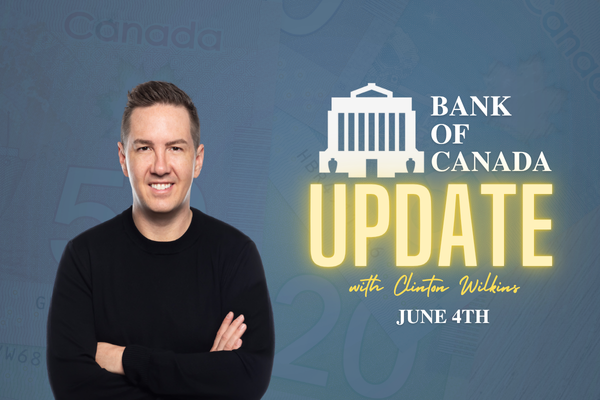Clinton Wilkins joins Todd Veinotte on 95.7 News Radio to discuss The Bank of Canada holding its key policy rate at 2.75%, marking the first pause after seven consecutive cuts.

News Update: 95.7 News Radio – Busy Year for the Market – December 9th
Clinton joins Todd Veinotte on 95.7 News Radio to discuss the Bank of Canada’s recent rate decision of a potential 25 or 50 basis point decrease. He noted that 2024 was a busy year for the market, with interest rates impacting both prices and demand.
Todd Veinotte
All right, joining us for a chat. Clinton Wilkins, our mortgage guru. Clinton Wilkins, it’s been a while, my friend, how are you?
Clinton Wilkins
Good, how are you Todd, welcome back!
Todd Veinotte
Thank you so much. I’m doing all right. I’m hanging in there. So yeah, it’s great, great to chat with you again. We have a Bank of Canada decision, or rate decision coming up on Wednesday. Is that correct?
Clinton Wilkins
That’s right. Wednesday is a big day, December 11. A lot of economists have been projecting that we’re going to see another decrease. I’m on the side with them, but there are two schools of thought. Some think that we’re going to see a 25 basis point decrease, and some think that we’re going to see another jumbo decrease of 50 basis points. So I expect our listeners will be very keen to hear the announcement here on Wednesday. I know I am, for sure.
Todd Veinotte
I’ll bet you and all your clients are a bit. I saw this story on the global news website Canadian real estate watchers are expecting home prices and housing activity to rise in 2025 after what they call a recovery year, but the Bank of Canada’s policy rate still have sway over how quickly buyers come back. Here’s the rub with all of this Clinton, and then you live with this day-to-day that people are saying, well, I’m going to wait till rates bottom out. But in the meantime, competition for housing and prices for housing goes up when rates are dropping. So if you wait around too long, you’re not gaining that this is, this is the balancing act, right, that you deal with every day.
Impact of Interest Rates on Housing Market
Clinton Wilkins
It’s definitely a balancing act. And I can tell you, we’re seeing that this year, it was very, very busy for us. It’s almost one of our best years ever. And I would assume consumers would think that it was maybe 2020 or 2021 when there was just so much activity in the market. But the interesting thing is, the clients that we had that were willing to proceed, at higher interest rates, are getting accepted offers. Although we didn’t see the price decrease here as they did in Ontario and BC, it has been more level here in Halifax, which is much healthier. It’s more healthy for sellers and it’s more healthy for buyers. But I think my concern is, once we continue to see the rates go down even more, there are going to be people that go back into the marketplace that weren’t in the market before, and it’s going to increase the demand. We certainly do have a lot of demand here in Halifax already, but there is some pent-up demand for people who have been waiting on the sidelines. One thing that I always say is, that you’re only dating the interest rate, but you’re carrying the home. That’s the one thing that we need to remember, the purchase price of the home does not change once you own it, but rates change from term to term.
Todd Veinotte
Again, I think this is a good lesson for people whose win rates were hitting their peak here, who had variable mortgages, who pulled the pin on it, and now they might be like that, saying I should have held on to my variable mortgage.
Homeownership Affordability and Market Dynamics
Clinton Wilkins
I can tell you, certainly a lot of customers want to go back into a variable right now. And the new mortgages that we’re doing are very, very popular, especially with the rate decreases. They’ve decreased even more than you and I projected when we started, you know, Mortgage 101, at the beginning of this year, I was estimating that we’re going to see a 100 basis point decrease, but we’re already now at 125 and maybe it’ll be 150 or 175 here before the end of the year. So, it certainly decreased more quickly than we thought. But that was really driven by what’s going on with inflation, and really the GDP and the job numbers here. The one thing that I’m watching is what’s going on in the US. That can have some impact. Again, it’s not a one-to-one, Inc., impact on what’s going on in the US. I don’t get me wrong, but what’s going on in the bond market, and you know, some of the policies that may come out of the US can certainly impact us here in Canada.
Todd Veinotte
What has a bigger impact, from a psychological level, on a purchaser, is it the price the rate, or both?
Clinton Wilkins
I think it’s both. But I think from a consumer perspective, I think we’re just so kind of numb to the price where, like, okay, prices are going up across the board on everything. I think we’re numb to maybe purchase prices of real estate, especially since 2020 I mean, we’ve seen five years of really healthy price growth here in Halifax. You know, I think people get the sticker shock with the rate because the rate is impacting the payment, and I think sometimes consumers are more worried about that payment that’s coming out of their bank account every day compared to the actual purchase price. I’m not sure anyone remembers the interest rate. You know, I’ve been doing this for almost 20 years, so I’m in 19 years. It’ll be 20 years next year, and if we surveyed all the customers that we did mortgages for even three and five years ago, they wouldn’t remember the exact interest rate that they had.
Todd Veinotte
I’ll bet another story of interest that I sent along. Do you want to get your take on it? This is off the CTV website. This is a new report looking into homeownership affordability reveals an unsettling picture of how far out of reach. Owning a home is becoming in Canada. The survey from Leger shows that 67% of Canadians can’t comfortably afford their monthly housing costs above about $1,700 per month. So again, you’re living this every day as well. I’m sure you get calls daily and emails from people every day. What’s your kind of takeaway?
Clinton Wilkins
I agree with it. I think that the housing cost has increased faster than, you know, wages have paced. That has been, the impact of interest rates and, you know, rental costs and purchase price and inflation across the board. The one interesting thing that I saw there was an article on all of Nova Scotia here, I think, last week, and one of the major landlords in Halifax has said the demand for apartments is starting to decrease. That’s the first time that we’ve ever seen anything around a decrease in demand. And they said that the average price for a two-bedroom apartment now in Halifax has gone down, and it’s just under $2,500 a month. So I would agree with the article. I think housing certainly is more expensive, and I think the percentage of a household’s monthly budget, more and more has gone to housing than in previous and that’s one thing that we’re we’ve just had to adjust. I think as Canadians, the increments will continue to increase. But I hope that we get to a plateau-type situation in the housing cost, and I think we will if we can get more and more supply on hand. That was our biggest issue here in Halifax, driving the price and the price increases, even in real estate, there hasn’t been enough supply to eat up the amount of demand here in our marketplace.
Investor Activity and Market Supply
Todd Veinotte
Another story want to throw at you, and I know that you’re able to pivot, so I’m going to do this. Stats Canada says investors represented three in ten residential property buyers in Nova Scotia, from 2018 to 2020, that’s the highest volume of such buyers among provinces where data is available. Are you seeing this? And with many of these property buyers coming in with cash, would some of that be mortgaged, or both?
Clinton Wilkins
I would say 90% of buyers are getting a mortgage. It doesn’t matter what type of buyer is getting a unique mortgage. Even the people that you think are independently wealthy and they can just pay cash for everything, they are still getting a mortgage, because I think that’s the prudent thing. They want to be able to write the interest off against, you know, maybe the cost, the amount of rent that’s coming in terms of the income. But the one thing I will say, I’m seeing a major slowdown in people buying second homes and rental properties due to the change in the tax scheme around capital gains. So, yes, maybe in 2020, 2021, up to Midway even through this year, we saw a lot of transactions for second homes and rental properties. But that has slowed since the changes that have come out from the federal government.
Todd Veinotte
So that tells me that if creating housing is the key, that’s perhaps working. What are your thoughts?
Year-End Market Trends and Future Outlook
Clinton Wilkins
I think it’s working. And I think the change in the federal government around capital gains has slowed down these investors, and I think it’s given more of an opportunity for people to buy owner-occupied properties. I think that’s positive. I think the challenge here in our market is we’re just not pumping out enough real estate. There certainly are a lot of cranes in the sky or are a lot of cranes in the sky here in Halifax, I think we’re gonna see more rental stock coming on, and I hope that that will then maybe free up some single-family homes that will become for sale. Just imagine if you’re a little old lady or a little old man, and you want to go into an apartment, but there are no apartments to have. You’re not selling your home. These are the homes that typically, maybe a first-time homebuyer would be able to afford might be a fixed dropper, for example. I’m very optimistic in terms of what we’re going to see next year, and I’m going to go out on a limb that we’re going to see at least a 5% price growth. But I think the other thing that we’re going to see, especially with the rates going down, is at least a 5% if not more activity in the market. So I think these two things together. I think that next year is going to be one of the busiest years in real estate here in Halifax. And I think it might even challenge the numbers that we saw, for example, in 2022.
Todd Veinotte
If people are just waiting for that kind of rock bottom rate to purchase might not always be prudent.
Clinton Wilkins
I think it is more expensive. Maybe the cost of borrowing is less. But you know, you can’t change the price of the house once you own it. So I would challenge the people that are kind of sitting on the fence like the first quarter, January, February, and March a great times to buy. And even in December, we’re seeing a lot of transactions now Todd, and I will say from November, we haven’t had a November this busy in years. This, I think, was a symptom of this pent-up demand. But, you know, with these people that were on the sidelines, I think now have started to come back into the marketplace. You know, there’s a lot of positive news coming out of the Bank of Canada. I think those rates are going to continue to decrease. The one thing, one message I want to give to our listeners is, that although variable rates may continue to go down, that doesn’t necessarily mean that fixed rates are going to go down. They move completely independently of each other, and if you’re watching the bond markets, if anything, we might even see fixed rates increase and variable rates decrease. So we just need to remember that they’re not tied one-to-one and the best. Vice from a more you know, for mortgage comes from a mortgage broker, all right?
Todd Veinotte
And of course, we’ll have lots to talk about a Mortgage 101, in the New Year, which is always great.
Clinton Wilkins
It’s going to be good. We’re gonna have a great season here in 2025 it’s hard to believe that we’ve now gone seven years. January, we’re going to talk about “Merry Debt-mas” and, it’s been a challenging year, I think, for some people, especially from an economic standpoint around inflation and consumer debt, which is at an all-time high. We’re certainly gonna have a focus on that in January, and we’re gonna have some really good conversations about, you know, how you can handle that and really what you need to do to have a healthy and secure 2025.
Todd Veinotte
Thanks so much, pal.
Clinton Wilkins
Thanks, Todd. Have a great holiday.
Todd Veinotte
I know you’re going away, but I want to have I want to spend some time with you so we can have some programming and have your voice heard over the holiday. So we’ll be in touch.
Clinton Wilkins
We’ll get a date for sure, and we’ll chat with you very soon.
Todd Veinotte
Talk soon. Take care. Clinton Wilkins, our mortgage guru.


